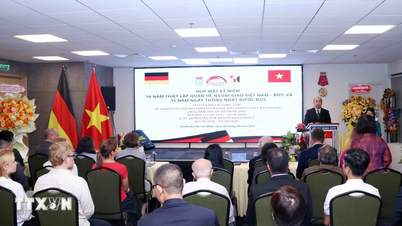Scientists at the Photonic Network Laboratory, part of Japan's National Institute of Information and Communications Technology (NICT), have just announced a new world record for internet data transmission speed, reaching 125,000 GB/second over a distance of 1,802 km.
This achievement was made possible by the successful development of a groundbreaking new type of optical cable.
This record speed is 4 million times faster than the average fiber optic internet speed in the US, allowing users to download hundreds of thousands of high-quality (HD) movies in just one second.
Rough estimates suggest that the entire Internet Archive's massive library could be downloaded in less than four minutes at this speed.

New data transmission technology by Japanese scientists could help build super-smart artificial intelligence systems (Illustration: Pinterest).
NICT's new record far surpasses the old record set last year by scientists at Aston University (UK), with a data transfer speed of 50,250 GB/s.
Scientists at NICT say a newly developed fiber optic cable is capable of sending data at breakthrough speeds over a distance equivalent to that from New York state to Florida.
To achieve this, they compressed 19 individual optical fibers into a cable that is just 0.005 inches (0.127 mm) in diameter, which is about the size of most standard optical cables today. This is important because the new optical cable can be deployed on existing infrastructure without major changes.
Previously, in March 2023, the NICT research team also achieved a similar data transmission speed, but only over a distance one-third of this new record.
The biggest challenge in increasing the data transmission distance is signal attenuation. To solve this problem, researchers have combined various amplification technologies to increase the signal transmission power, while exploiting the properties of each wavelength of light to optimize the signal transmission capacity through the fiber optic system.
This new record shows the remarkable progress in technology to develop high-speed, large-capacity and long-distance data transmission Internet systems, meeting the growing demand for connectivity globally.
While promising, it’s unclear exactly when this technology will be implemented. Even if it is deployed, it will still be a research priority and it will likely be years before the average user has access to this super-fast internet technology.
The practical application of super-fast Internet speeds could become a solid foundation for developing super-smart artificial intelligence (AI) systems, where data can be transmitted and received in the blink of an eye between servers and AI systems, helping them make decisions and handle problems more quickly and intelligently.
Source: https://dantri.com.vn/cong-nghe/nhat-ban-lap-ky-luc-ve-toc-do-internet-nhanh-gap-4-trieu-lan-mang-tai-my-20250717093834762.htm


![[Photo] General Secretary To Lam receives US Ambassador to Vietnam Marc Knapper](https://vphoto.vietnam.vn/thumb/1200x675/vietnam/resource/IMAGE/2025/9/29/c8fd0761aa184da7814aee57d87c49b3)
![[Photo] The 1st Congress of Phu Tho Provincial Party Committee, term 2025-2030](https://vphoto.vietnam.vn/thumb/1200x675/vietnam/resource/IMAGE/2025/9/30/1507da06216649bba8a1ce6251816820)
![[Photo] Solemn opening of the 12th Military Party Congress for the 2025-2030 term](https://vphoto.vietnam.vn/thumb/1200x675/vietnam/resource/IMAGE/2025/9/30/2cd383b3130d41a1a4b5ace0d5eb989d)
![[Photo] General Secretary To Lam, Secretary of the Central Military Commission attends the 12th Party Congress of the Army](https://vphoto.vietnam.vn/thumb/1200x675/vietnam/resource/IMAGE/2025/9/30/9b63aaa37ddb472ead84e3870a8ae825)
































![[Photo] General Secretary To Lam attends the ceremony to celebrate the 80th anniversary of the post and telecommunications sector and the 66th anniversary of the science and technology sector.](https://vphoto.vietnam.vn/thumb/1200x675/vietnam/resource/IMAGE/2025/9/29/8e86b39b8fe44121a2b14a031f4cef46)


































































Comment (0)